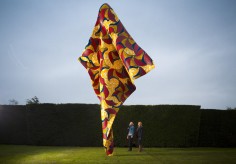YINKA SHONIBARE
Wind Sculpture 1

source: yinkashonibarembe
Yinka Shonibare, MBE was born in London and moved to Lagos, Nigeria at the age of three. He returned to London to study Fine Art first at Byam Shaw College of Art (now Central Saint Martins College of Art and Design) and then at Goldsmiths College, where he received his MFA, graduating as part of the ‘Young British Artists’ generation. He currently lives and works in the East End of London.
Over the past decade, Shonibare has become well known for his exploration of colonialism and post-colonialism within the contemporary context of globalisation. Shonibare’s work explores these issues, alongside those of race and class, through the media of painting, sculpture, photography and, more recently, film and performance. Using this wide range of media, Shonibare examines in particular the construction of identity and tangled interrelationship between Africa and Europe and their respective economic and political histories. Mixing Western art history and literature, he asks what constitutes our collective contemporary identity today. Having described himself as a ‘post-colonial’ hybrid, Shonibare questions the meaning of cultural and national definitions.
Shonibare was a Turner prize nominee in 2004 and awarded the decoration of Member of the “Most Excellent Order of the British Empire”. He has added this title to his professional name. He was notably commissioned by Okwui Enwezor At Documenta 10 in 2002 to create his most recognised work ‘Gallantry and Criminal Conversation’ that launched him on an international stage. He has exhibited at the Venice Biennial and internationally at leading museums worldwide. In September 2008, his major mid-career survey commenced at the MCA Sydney and toured to the Brooklyn Museum, New York in June 2009 and the Museum of African Art at the Smithsonian Institution, Washington DC in October 2009 . In 2010, ‘Nelson’s Ship in a Bottle’ became his first public art commission on the Fourth Plinth in Trafalgar Square.
.
.
.
.
.
.
.
.
source: stephenfriedman
Yorkshire Sculpture Park in Wakefield is to exhibit the first major UK survey of works by Yinka Shonibare, MBE.
Taking place in three of Yorkshire Sculpture Park’s indoor galleries and the open air, ‘FABRIC-ATION’ features over 30 vibrant works from the period 2002 – 2013 including sculpture, film, photography, painting and collage, with many works never before seen in the UK.
FABRIC-ATION is a unique opportunity for audiences to trace Shonibare’s creative development over the past decade at a time when he is increasingly active in creating work for public space. Two major commissions, the first works in a new series for the UK, premiere in the Park’s Arcadian landscape. Standing over six metres tall, Wind Sculptures (2013) are richly coloured, painted with Shonibare’s signature batik-inspired surface pattern. Although constructed in fibreglass, they appear fluid like fabric caught by the breeze. These follow the recent success of Shonibare’s commissions for the Royal Opera House, London (2012) and the Fourth Plinth in Trafalgar Square (2010).
Further new work on show in the galleries includes Revolution Kids (2012), half-human, half-animal embodiments of an insurrectionist spirit, waving replicas of Colonel Gaddafi’s golden gun and carrying an obligatory Blackberry. Marking the first time that Shonibare has used taxidermy in his practice, these hybrid figures embody the artist’s response to the London Riots where social media was used as a revolutionary tool, and the Arab Spring with its overriding sense of transformation through insurgence. These powerful works reflect the currency and topical fervency of Shonibare’s work in this timely exhibition.
.
.
.
.
.
.
.
source: soicomvn
Yinka Shonibare MBE là một trong những gương mặt quan trọng nhất của nghệ thuật đương đại hậu thuộc địa. Anh sinh ở London nhưng lên ba đã sang Nigeria sống, sau này quay lại Anh để học mỹ thuật. Những tác phẩm điêu khắc quan trọng của anh là những đàn ông, đàn bà, trẻ con không đầu, gợi lên sự dịch chuyển về mặt thể lý này, cũng như gợi lên thứ ngôn ngữ phổ quát của toàn cầu hóa.

